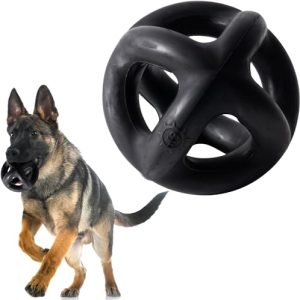Have you ever noticed your dog suddenly disappearing under the bed and wondered why? It can be puzzling to see your furry friend choose such a tight, hidden spot.
You might worry if something is wrong or if your dog is trying to tell you something. Understanding why your dog goes under the bed can help you connect better and make your pet feel safe and happy. Keep reading to discover the surprising reasons behind this behavior and what it means for your dog’s well-being.
Seeking Comfort
Dogs often hide under the bed to feel calm and at ease. This quiet spot helps them relax and feel safe. It is their way of finding comfort in a busy home. Understanding why your dog seeks this space can help you meet their needs better.
Safe Space For Dogs
Under the bed, dogs find a small, protected area. It feels like a den, where no one can easily reach them. This safe space helps reduce anxiety and stress. Dogs naturally look for places where they feel secure.
Temperature Control
The floor under the bed often stays cooler than other areas. Dogs use this spot to cool down during warm days. In colder times, it can also provide warmth by blocking drafts. This helps dogs regulate their body temperature comfortably.
Soft And Cozy Spot
The area under the bed can be soft and cozy. Blankets, pillows, or even the carpet make it comfortable. Dogs enjoy resting in snug places that feel like a nest. This comfort helps them sleep better and feel relaxed.

Credit: www.yahoo.com
Avoiding Stress
Dogs often seek quiet, safe spaces to avoid stress. The space under the bed offers a perfect retreat. It feels like a small den, away from the outside world. This hiding spot helps dogs feel calm and secure. Stress can come from many things in a dog’s environment. Understanding why they hide can improve their comfort and well-being.
Hiding From Loud Noises
Loud sounds can scare dogs deeply. Thunderstorms, fireworks, or vacuum cleaners create noise that feels threatening. Under the bed, sounds are muffled and less harsh. This shelter reduces fear by blocking out overwhelming noise. Dogs feel safer and can rest without constant stress. This behavior is natural and protective.
Escaping Overstimulation
Busy homes can overwhelm dogs with sights and sounds. Too many people, loud voices, or sudden movements cause stress. The space under the bed offers a quiet break. Dogs use it to calm down and recharge their energy. This pause helps them avoid feeling anxious or upset. It is a simple way for dogs to manage their emotions.
Responding To Anxiety
Anxiety can make dogs feel unsafe and nervous. Changes in routine, new places, or strangers may trigger this. Hiding under the bed gives dogs a private space to cope. It acts as a safe zone where they can relax. This behavior helps reduce their stress hormones. It shows the dog is trying to protect itself emotionally.
Instinctual Behavior
Your dog’s habit of slipping under the bed often reflects deep-rooted instincts shaped over thousands of years. These behaviors are not random but are tied to their survival and comfort mechanisms. Understanding these instinctual actions can help you better meet your dog’s needs and provide a more secure environment.
Denning Instincts
Dogs share an instinct to find small, enclosed spaces—like dens—to rest and feel safe. This behavior comes from their wild ancestors who sought dens for protection from predators and harsh weather. When your dog crawls under the bed, it’s their way of creating a personal, cozy den where they can relax without disturbance.
Have you noticed your dog retreating under the bed during thunderstorms or fireworks? This is their natural response to seek a quiet, sheltered spot during stressful events.
Natural Shelter Seeking
Beyond comfort, dogs look for shelter to regulate temperature and avoid threats. The space under your bed offers shade and a cool surface during hot days, or a warm hideaway during cold nights. This instinctual shelter-seeking is about survival, even if your home is safe and climate-controlled.
Think about how your dog chooses their favorite resting spots—do they prefer corners or tucked-away places? These choices reveal their desire for a protective space where they feel secure.
Territory Marking
Dogs use scent to mark their territory, and hiding under the bed can be part of this behavior. By spending time in that spot, your dog deposits their scent, claiming it as their own safe zone. This helps them feel more confident and establishes boundaries within your home.
Have you ever noticed a specific spot your dog favors repeatedly? It’s often a place they’ve marked to maintain a sense of ownership and comfort. You can encourage this by providing a designated bed or blanket to help them feel more secure.

Credit: www.reddit.com
Health-related Reasons
When your dog suddenly starts hiding under the bed, it’s often a sign linked to their health. Dogs instinctively seek safe spots when something feels off. Understanding these health-related reasons can help you respond quickly and appropriately to your furry friend’s needs.
Feeling Unwell
Dogs hide when they feel sick or under the weather. Illnesses like stomach upset, infections, or even mild fevers can make them retreat to quiet, dark places.
Have you noticed your dog avoiding food or looking lethargic before heading under the bed? These signs often accompany their desire to isolate themselves when feeling unwell.
Pain Or Discomfort
Pain is a powerful motivator for dogs to seek solitude. Whether it’s arthritis, an injury, or dental problems, discomfort drives them to find a spot where they won’t be disturbed.
One dog owner shared how their pup hid under the bed during a painful ear infection. Recognizing this behavior prompted a timely visit to the vet, leading to quick relief.
Seeking Solitude
Sometimes, your dog isn’t just hiding—they’re protecting themselves while healing. Solitude provides a calm environment for recovery, away from noise and activity.
Ask yourself if your dog’s usual behavior has changed. Do they return to normal after resting, or do they keep hiding? This can tell you if their retreat is health-related or just a preference for quiet.
Attention And Interaction
Dogs often seek attention and interaction in ways that might surprise you. Going under the bed is one of those curious behaviors that can signal your dog’s desire to engage with you or test their environment. Understanding these moments can help you strengthen your bond and communicate better with your furry friend.
Testing Boundaries
Your dog might slip under the bed to see how you react. It’s their way of testing what’s allowed and what isn’t in your home. Have you noticed if your dog waits to see if you call them out or try to grab them? This behavior is a subtle challenge to your rules and an invitation to interact.
Try gently encouraging your dog to come out with treats or toys. This can turn their boundary-testing into a fun game that reinforces positive behavior. It also shows them you’re paying attention and ready to engage on their terms.
Playing Hide And Seek
Sometimes, your dog simply wants to play. Hiding under the bed can be their version of a game of hide and seek. If you respond by searching for them or calling their name, it becomes a playful interaction that excites them.
Think about the last time your dog dashed under the bed during playtime. Did you chase or coax them out? This back-and-forth creates a lively and rewarding connection. You can use this behavior to make play sessions more interactive and enjoyable.
Seeking Owner’s Attention
Your dog may retreat under the bed when they want your focus but aren’t sure how to get it. This spot feels safe, yet close enough to keep an eye on you. Have you caught your dog peeking out from under the bed right when you’re busy?
Responding with calm, gentle attention can reassure your dog and strengthen your relationship. Try sitting near the bed and softly calling their name or offering a hand to invite them out. This simple act shows your dog that they have your attention without needing to hide.

Credit: www.reddit.com
When To Be Concerned
Noticing your dog hiding under the bed can be puzzling. While it might be a harmless habit, sometimes it signals something more serious. Understanding when to be concerned can help you respond appropriately and keep your furry friend safe.
Signs Of Stress Or Illness
Does your dog suddenly retreat under the bed more often or for longer periods? This could indicate stress or illness. Look for other signs like trembling, whining, or avoiding eye contact.
Physical symptoms might include vomiting, diarrhea, or a lack of appetite. These clues suggest your dog isn’t just seeking comfort but may be feeling unwell.
Changes In Behavior
Have you noticed your dog acting differently in other ways too? Changes like increased aggression, lethargy, or loss of interest in walks are red flags.
Sometimes, dogs hide when they feel scared or insecure. If your dog’s usual playful nature turns quiet or withdrawn, it’s time to pay attention.
Consulting A Veterinarian
If your dog’s hiding becomes frequent or is paired with worrying symptoms, don’t hesitate to seek professional help. A vet can rule out medical problems and provide advice tailored to your dog’s needs.
Early intervention often makes a big difference. Have you scheduled a check-up when you first noticed these changes? It’s better to be safe and get clarity.
Frequently Asked Questions
Why Does My Dog Hide Under The Bed?
Dogs often seek safety, comfort, or solitude under the bed. It could be due to stress, fear, or anxiety. Sometimes, it’s simply a cozy spot they prefer. Observe their behavior and surroundings to identify any triggers. If concerned, consult a veterinarian for advice.
Is It Normal For Dogs To Go Under Beds?
Yes, it’s normal for dogs to seek shelter under beds. It’s a natural behavior that provides them with a sense of security. Dogs might hide during loud noises like thunderstorms. Ensure the space is safe and free of hazards for them.
How Can I Stop My Dog From Hiding?
To stop your dog from hiding, identify the root cause. Provide them with alternative safe spaces like a cozy crate. Offer comfort during stressful situations and ensure their environment is calm. Gradual desensitization to triggers can also help reduce hiding behavior.
Could My Dog Be Sick If Hiding?
Yes, illness can be a reason dogs hide. If your dog suddenly starts hiding, watch for other symptoms. Loss of appetite, lethargy, or changes in behavior can indicate health issues. Consult a veterinarian for a thorough examination to rule out any medical concerns.
Conclusion
Dogs go under the bed for many simple reasons. They may want a quiet, safe spot. Sometimes, it feels warm and cozy there. It can also be a way to hide or feel calm. Watching your dog’s behavior helps you understand their needs better.
Giving them a special place nearby can make them happy. Remember, patience and kindness build trust with your pet. Small changes can improve your dog’s comfort and mood. Knowing why your dog hides helps you care for them well.

Emily Barker is the founder of ChillDogLife.com, a space dedicated to helping pup parents discover the best dog products, lifestyle tips, and cozy ideas for happier homes.
A lifelong dog lover, Emily combines her passion for pets with a knack for research to share trusted recommendations on everything from toys and furniture to health and everyday care.
Her goal is simple: to make life easier, stylish, and more joyful for dogs and the people who love them.







